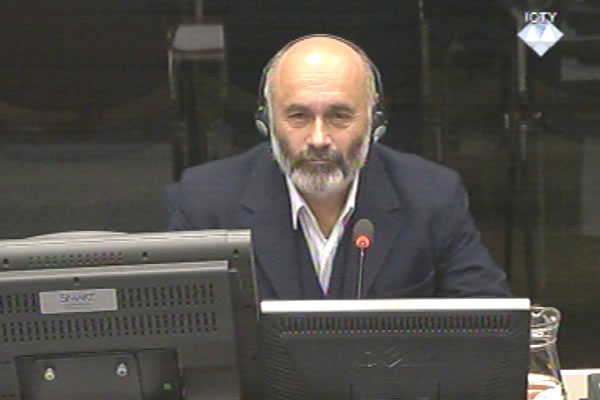Home
COMPULSORY WORK SERVICE TO MAKE NON-SERBS ‘FEEL USEFUL’
In his evidence in Radovan Karadzic’s defense, the wartime chief of the Defense Secretariat in Sanski Most claimed that many people who were assigned to compulsory work details, digging trenches and clearing minefields in the battlefield were given an opportunity to ‘feel they are useful, that they are contributing to the community’s welfare’. They were thus ‘included into the community, rather than being underrated’, the witness explained
 Boro Tadic, witness at the Radovan Karadzic trial
Boro Tadic, witness at the Radovan Karadzic trial In the spring of 1992 Boro Tadic was a battalion commander in the JNA 6th Sana Brigade, and later became the chief of the National Defense Secretariat in Sanski Most. As alleged in the indictment, Sanski Most is one of seven municipalities where ethnic cleansing reached the scale of genocide.
In his statement to Radovan Karadzic’s defense the witness said that in April 1992 his brigade was sent to Sanski Most to ‘keep the peace and prevent inter-ethnic conflicts’. In Tadic’s words, the brigade ‘protected all citizens regardless of their ethnic background’, but Croat and Muslim paramilitary units attacked the JNA.
In the statement Tadic also said that he didn’t know if SDS members or Radovan Karadzic ever spread propaganda to instill fear in Serbs that the Muslims or Croats were ready to commit ‘new genocide’ against them. In the cross-examination, prosecutor McKenna played a video recording of an SDS rally in Banja Luka on 3 March 1991. At the rally Karadzic promised the audience that they wouldn’t be ‘left in the lurch to be butchered’ as they had been in 1941. Tadic said he didn’t know if such statements instilled fear of other ethnic communities. In Tadic’s view, Karadzic merely ‘called for caution’.
As an example of dehumanization of non-Serbs the prosecutor showed a bulletin produced by the Sanski Most Crisis Staff. Nedeljko Rasula refers to Muslims and says ‘if they are a nation at all’. In Rasula’s words, Croats are a people who ‘for centuries have carried in their genes the thirst to kill those who are better and more honest than them’. The witness insisted that ‘the same thing is replayed today’, as recently the crowds at football stadiums in Split and Zagreb chanted Ustasha salutes.
Tadic argued that Muslims ‘deserted their brother Serbs by converting to another religion’. He said the same thing when he spoke to the local Muslims in the spring of 1992. Today Tadic explained, ‘from the look on my face and my words that radiated love’ Muslims could ‘read the desire for peace and the wish that they would have a change of heart and not act as they had in 1941’
However, Tadic claimed that he didn’t know the details of what the 6th Brigade did in the course of the attacks on the Muslim villages and the seizure of power in Kljuc and Sanski Most. The prosecutor insisted that Tadic reply to the question if he had heard about the detention of thousands of civilians from Mahala in a football stadium and about a number of murders during the attack on that part of the town. Tadic said that ‘there were all kinds of rumors’, but that he was not there at the time.
During the war Tadic was in charge of assigning non-Serbs to compulsory work service. According to Tadic, the prosecutor’s allegation that Croats and Muslims were sent to the battlefields to dig trenches and clear minefields and were tortured was ‘a one-sided interpretation and total misunderstanding of the situation’. According to Tadic, ‘just 113’ persons sent to do compulsory work on the battlefields is ‘not a large number’ compared to the thousands of Serbs who were killed in combat. Also, the work service made Muslims ‘feel they are useful, that they are contributing to the community’s welfare’, Tadic said. They were ‘included into the community, rather than being underrated’, Tadic added.
Linked Reports
- Case : Karadzic
- 2013-12-03 ‘OUTSTANDING INTELLIGENCE OFFICER’ KNEW NOTHING
- 2013-11-29 MEJAKIC: WE WERE ORDERED TO GIVE ‘OFFICIAL VERSION’
- 2013-11-28 PRISONERS NEVER ARRIVED IN BATKOVIC CAMP
- 2013-12-05 ‘VOLUNTARY EVACUATION’ FROM SANSKI MOST AND KLJUC
- 2013-12-06 PEOPLE MOVED OUT OF SANSKI MOST VOLUNTARILY, NOT BECAUSE THEY WERE FORCED TO
- 2013-12-08 KARADZIC FEARS THAT AMERICA EAVESDROPS ON HIM IN THE HAGUE
